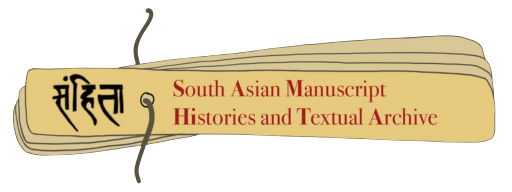Manuscripts
Search Filter
Śukarambhāsaṃvāda
ark:/12148/btv1b53153997b Language : Sanskrit Scripts : Devanagari
A philosophical dialogue between Śuka and Rambhā.
Marudevyāstuti
ark:/12148/btv1b53148181m Language : Sanskrit Scripts : Devanagari
This is from the Ādipurāṇa, a ninth-century Sanskrit text by Jinasena on the life of Rishabhanatha, the first Jain Tirthankara.
Composite manuscript: Anekārthadhvanimañjarī, Abhidhānacintāmaṇi, Upadeśamālāprakaraṇa, Yogacintāmaṇi
ark:/12148/btv1b53157077g Language : Sanskrit and Prakrit Scripts : Devanagari
Anekārthadhvanimañjarī (first eight folios) is a lexicographic text. 39 The Abhidhānacintāmaṇi is a major lexicon compiled by Hemacandra, it is accompanied by a commentary. The Upadeśamālāprakaraṇa is a Jain text in Prākrit. The last text is Yogacintāmaṇi, also known as Vaidyakasāroddhāra and Vaidyakasārasaṅgraha, authored by Harṣakīrti Sūri, disciple of Candrakīrti.
Rāmamantrārādhanavidhi
ark:/12148/btv1b53148208t Language : Sanskrit Scripts : Devanagari
A text which shows tantric influences and contains mantras for the worship of Rāma, Sītā and others. The text mentions the meter of the mantras.
Sāvitrīvrata / Vaṭasātrīvrata
ark:/12148/btv1b100828214 Language : Sanskrit Scripts : Devanagari
The story of Sāvitrī forms the basis of a ritual (vrata) that women perform for their husband’s health and longevity. The text describes the ritual performed before a vata (banyan) tree, followed by the narrative of Savitri.
Sārakaumudī
ark:/12148/btv1b10082554k Language : Sanskrit Scripts : Bangla
An Āyurvedic text on diseases, their symptoms and treatment. It is also known as Cikitsāsārakaumudī.
Collection, including Bilhanacharita, Bhartṛhariśataka ; Paṇḍitarājakṛti
ark:/12148/btv1b10082730q Language : Scripts : Tamil
Praśnottararatnamālā
ark:/12148/btv1b53148244p Language : Sanskrit Scripts : Devanagari
A Jaina text with its commentary, written in question-answer mode. Both text and commentary are in Sanskrit.
Composite manuscript: Svopajňaliṅgānuśāsanavivaraṇa, Anekārthasaṃgraha, Unknown, Śabdānuśāsana, Śabdānuśāsanāvacūrṇi.
ark:/12148/btv1b53157082n Language : Sanskrit Scripts : Devanagari
A collection of texts on lexicography and grammar, the first four of which are by Hemacandra. The first discusses gender. The second is dated to 1435 amd discusses indeclinables, and includes marginal notes. The third is incomplete with the title missing, and deals with verbal roots. The fourth is a lexicographic text. The last, Śabdānuśāsanāvacūrṇi, is by Nandasundaragaṇi, a Jain poet. It discusses prefixes, suffixes and word formation.
Śītalāṣṭaka
ark:/12148/btv1b531482348 Language : Sanskrit Scripts : Devanagari
This contains stotras in praise of goddess Śītalā.
Bhuvaneśvarīmantragarbhasahasranāmastotra
ark:/12148/btv1b53148240w Language : Sanskrit Scripts : Devanagari
This contains thousand names in praise of goddess Bhuvaneśvarī.
Composite manuscript: 1.Unknown, 2. Mūḍhaviḍambana, 3. Vidagdhamukhamaṇḍana, 4. Haribhaktivilāsa, 5. Jvarādicikitsā, 6. Gurasahasranāma, 7. Vagalāmukhīstrotra, 8. Gaṅgā stotra, 9. Vagalāmukhīkavaca, 10. Śyāmākavaca, 11. Viduranīti, 12. Nītiśataka.
ark:/12148/btv1b525084677 Language : Sanskrit Scripts : Medieval Bengali
The first text (title missing) is on Krishna and his lila. The second is a Sanskrit kāvya authored by Ṣaṣṭhīdāsa, son of Jayakṛṣṇa Tarkavāgīśa, and scribed by Rāmapatidevaśarmaṇ. The third is a collection of Sanskrit poetry and riddles, and is also scribed by Rāmapatidevaśarmaṇ. Haribhaktivilāsa, authored by Gopālabhaṭṭa, disciple of Prabodhānanda, describes Hari and his lila. Jvarādicikitsa is an Ayurvedic text on fevers and their remedies. The Gurasahasranāma evokes a guru’s attributes through praise names arranged alphabetically. The Vagalāmukhīstrotra has tantric mantras and rituals. The Gaṅgā stotra quotes Purāṇic verses on the Ganga. The Vagalāmukhīkavaca is a tantra text written on one folio. The Śyāmākavaca is part of Bhairavatantra. The Viduranīti is from the Mahābhārata. The lastmanuscript quotes some verses from the Nītiśataka of Bhartrihari.













